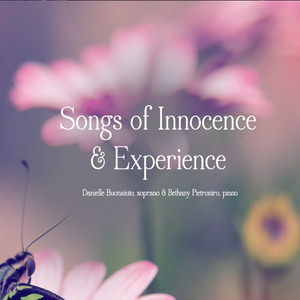
Songs of Innocence and Experience
- 流派:Classical 古典
- 语种:其他
- 发行时间:2014-03-28
- 类型:录音室专辑
- 歌曲
- 时长
简介
I’ve always been drawn to art song in English, particularly to song that sets poetry of our time and our cultural history in North America. There is much to be learned from exploring the incredibly rich traditions of German Lieder and French mélodie—and you will find examples of both on this album. Performing these songs is different, however, from having an emotional experience through music written in my native tongue. I think many audience members feel the same; while it’s not impossible to approach music of another, deeply rooted tradition, there is an extra layer of cultural knowledge whose absence makes the experience slightly more of a challenge. We can come to music and poetry from our own sphere of cultural experience with no glossary. The music of Richard Strauss and Maurice Ravel serves here as context—both the context of my classical training and the context for the genre of song in which Dominick Argento and Colin Read are writing. It is this deep tradition that formed a love of poetry in me and prompted me to explore art song in English, and to become someone who asked for it to be written. Another layer of context will emerge, I hope, from listening to this album all the way through: one of imagery and poetic voice. E.E. Cummings was certainly not an immature poetic voice, but he frequently employed playful and whimsical imagery to deliver incredibly rich, adult subject matter. This part of his oeuvre is coy, oblique in its naiveté. Lisa Rosinsky, an emerging voice in American poetry, offers a poem composed in youth and about youth, but mediated by her own evolving consciousness. Stéphane Mallarmé, one of the most celebrated French poets, is also one of the most difficult to approach. Reading his poetry becomes easier for me when I release the expectation of understanding it literally and intuit colour, shape, and feeling from the words—their meanings, as well as their sounds. Symbolist poetry is nonlinear and indirect—indirect, however, in a different way from Cummings or Rosinsky. Mallarmé purposely obscures the narrative in order for the reader or listener to experience the poem in an inexpressible way. The last four songs I have chosen are all by Strauss and probably somewhat familiar. These are four of his most celebrated songs—and rightfully so. They are unencumbered in their transmission of emotion, direct in both poetic and musical language. For me, they seem to come from a place of settled, self-confident emotion—no arrogance here, but bared souls and honest eyes. My title, “Songs of Innocence and Experience,” is a nod to William Blake; Pan makes a brief appearance via Cummings, as he does in the first half of Blake’s work. More than that, though, it speaks to my belief that our evolving perspective, as we grow from youth to adults, on our existence as sexual beings and as creatures capable of a great breadth of emotion, is absolutely central to our self-perception and our relationships—indeed, to our humanity.

